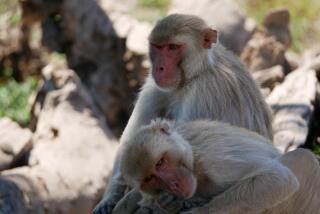A Pebble for Your Thoughts
- Share via
Humans love it when they spot anything resembling a human trait in animals. They’re so like us, aren’t they? Dogs who tilt their heads can only be silently querying; it couldn’t possibly be a crick in the neck. Cats who come when called. Birds who converse and mimic. Affectionate animals who care for humans as individuals and couldn’t possibly be sucking up like phonies. It’s all unbelievably cute and makes humans feel like they’re in charge.
So what to make now of remarkable research findings in Nature magazine that capuchin monkeys in social groups seem to have a clearly defined sense of fairness, even when dealing with unfair humans who keep them in cages? How did monkeys learn fairness in the jungle, as in law of the jungle?
What Emory University researchers did was train pairs of female monkeys to exchange a pebble for a treat. One pebble, one slice of cucumber. A pretty good deal, since the pebbles were free. But then these conniving humans started awarding a cucumber slice to one monkey while the second got another pebble. There was a pause. The slighted monkey watched her friend munch the veggie slice, looked back at the researcher and had a tantrum. Much noisy complaining, even slamming of the pebble. And the scientists received a cold monkey shoulder for a while. Then researchers awarded one monkey a tasty grape even without a pebble exchange and offered a cucumber slice to the second one, who had liked cucumber just fine before but now threw it down in disdain and refused to pay her pebble.
The humans didn’t bother testing male monkeys about fairness because as fathers to every youngster in their harems, they got whatever they wanted and shared everything anyway, except, being males, the TV remote. These sole patriarchs didn’t need cooperation or sharing to survive and took cucumber or grape with or without pebble. It’s all a fascinating peek into animaldom, raising questions about the existence of the concept of fairness in other social species, such as whales, wolves and car salesmen.
Did monkeys emerge from the jungle, study human fairness concepts and return home to apply them to the banana stash? Or is it more likely that Neanderthals weren’t really paying much attention to their monkey neighbors and evolved from tree jungles to asphalt jungles while carrying a vague memory about fairness being good when convenient?
That would explain things like slavery and those unlikable people who win the lottery jackpots. So next time you read about a dumb old monkey trading willing humans a pebble in exchange for a grape, think a bit about who’s training whom.






